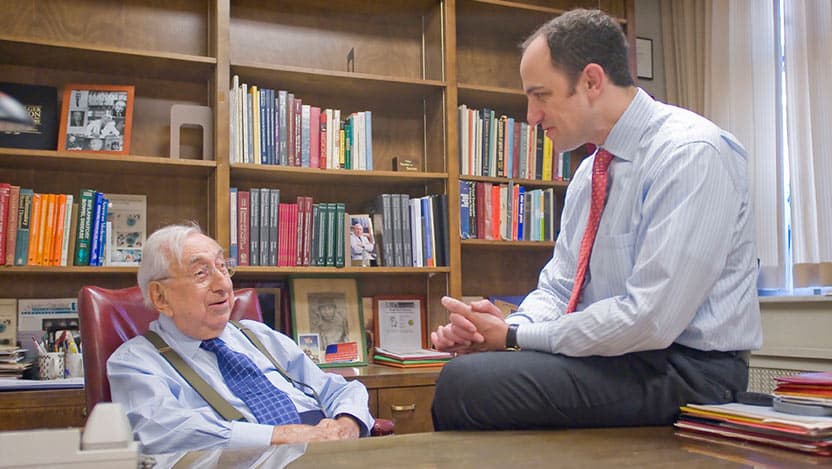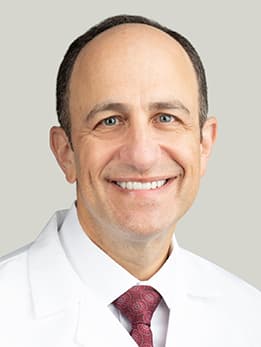Building on UChicago Medicine's storied history in inflammatory bowel disease care

David T. Rubin, MD, right, and his mentor, renowned gastroenterologist Joseph B. Kirsner, MD, PhD
In 1990, David Rubin came to Hyde Park, eager to begin his studies as a first-year medical student at the University of Chicago. But first, he had to complete an errand for his grandmother.
“Go see if my doctor is still there,” his Grandma Pearl had told him. “He’s very famous, but he might not be alive anymore.”
“What did he do for you?” Rubin asked.
“He saved my life,” she replied. “I have Crohn’s disease.”
“ ‘What’s that?’ ” Rubin recalled asking. “I had never heard of it. I knew nothing.”
At the time, the classes and offices were all in the Billings Hospital. A dutiful grandson, Rubin found a directory, looked up Joseph B. Kirsner, MD, PhD, and, not bothering to call for an appointment, made his way to the second floor and knocked on his office door.
Kirsner wasn’t just any doctor. He transformed the field of gastroenterology and pioneered the study and treatment of inflammatory bowel disease. He published more than 750 papers and 18 books, including the authoritative textbook for IBD.
Patients with digestive ailments need compassionate understanding, an idea that Kirsner embraced and preached.
Nevertheless, when young David Rubin knocked, he answered the door himself.
Rubin introduced himself and relayed Grandma Pearl’s message.
The physician, then 81, said, “Oh, come in and tell me about your grandmother.”
“So I walked into this big old academic office with certificates and diplomas on every wall and built-in wooden bookshelves,” Rubin recalled. Kirsner walked over to a file cabinet, opened a drawer, pulled out a published research paper on the use of steroids in treating Crohn’s, and said, “Your grandmother was one of the patients in this study.”
So began a more than 20-year relationship between the man many consider the grandfather of modern inflammatory bowel disease treatment and the student who would continue his legacy, though it still wasn’t a direct line from that meeting — or the occasional summons that brought Rubin back to the office over the next few years — and Rubin’s decision to dedicate his career and life to this field.
Rubin said he first envisioned himself as a surgeon, then maybe a cardiologist. Years later, when he was nearing the point when he would have to choose his specialty in internal medicine, he ran into Kirsner. As he would later tell the story, the interaction was brief.
“Hi, Dr. Kirsner,” Rubin said.
Kirsner responded in his hallmark, booming voice, “Don’t go into cardiology. We need you in gastroenterology.” And then he walked on.
And Rubin did.
Kirsner practiced medicine until he was 95, and Rubin agreed to take on many of Kirsner’s patients. That’s not to say Kirsner stopped working. He continued writing, preserving the history of the field of gastroenterology and the University’s role in it and giving Grand Rounds lectures.
One of the patients who had the pleasure of working with both Kirsner and Rubin is Seymour “Sy” Taxman, a Chicago real estate developer. Taxman serves on the board of the Dr. Joseph B. Kirsner died in 2012 at age 102. David Rubin gave a eulogy at the funeral.
“Dr. Kirsner became part of our family,” Rubin told the congregation.

David T. Rubin, MD
Dr. Rubin specializes in the treatment of digestive diseases. His expertise includes inflammatory bowel diseases (Crohn’s disease and ulcerative colitis) and high-risk cancer syndromes.
See Dr. Rubin's physician bio